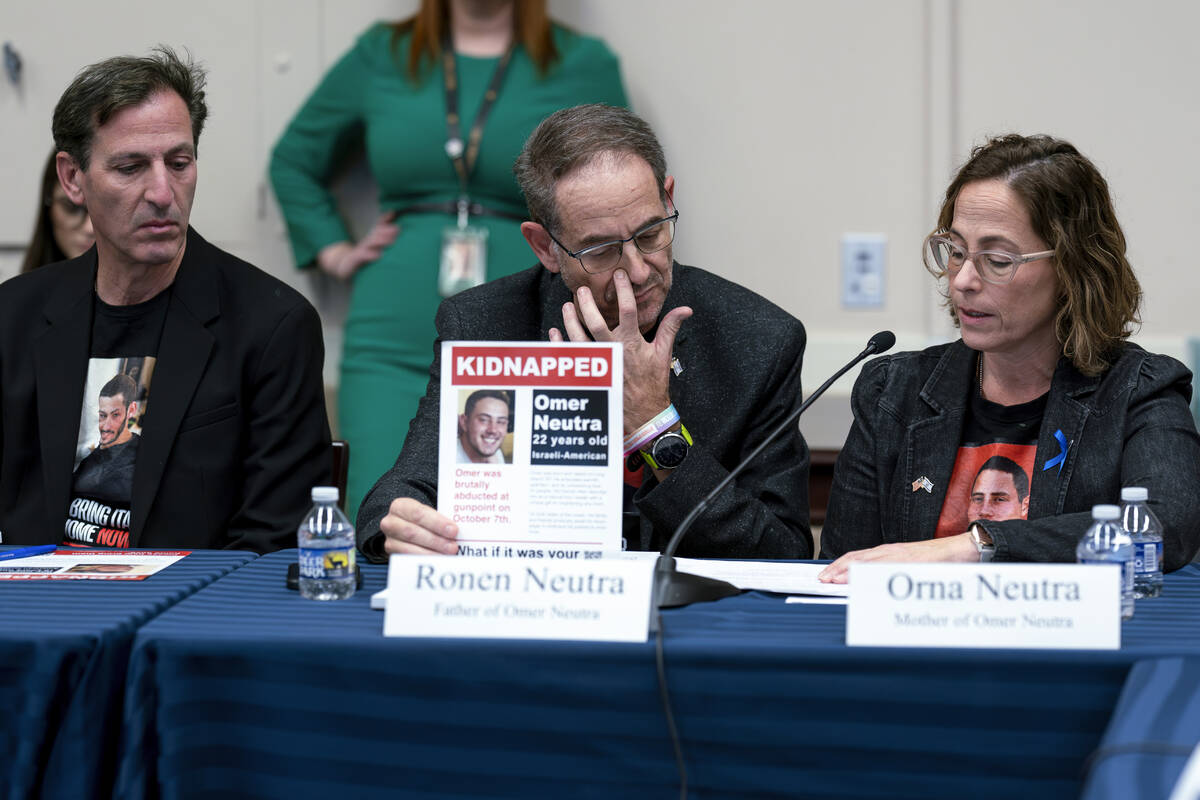Families of Americans held by Hamas describe their anguish

WASHINGTON — The last Omer Neutra’s parents heard from him, he told them reassuringly that he anticipated a quiet weekend.
But they checked the news anyway before getting ready for bed in New York, their nightly routine as parents of a soldier in the Israeli military tasked with protecting small villages near the Gaza Strip. What they saw horrified them.
“Of course, everything was wrong. Immediately, we understood that he’s right there,” his mother, Orna Neutra, said Wednesday of the brutal Oct. 7 rampage by Hamas terrorists that killed more than 1,200 civilians and soldiers and triggered a war in Gaza.
They would later learn that their son, a dual Israeli-U.S. citizen, had been ambushed, pulled out of his tank and taken as a hostage to Gaza, where he is believed to remain more than 50 days later.
The Neutras joined relatives of three other American hostages — including of newly freed 4-year-old Abigail Edan — in calling for the governments of Israel and the United States to do all they can to bring home their loved ones.
The group is in Washington to plead their case with journalists, at a legislative hearing on Capitol Hill and in meetings with senior Biden administration officials.
A second Israeli-American hostage, Liat Beinin Atzili, 49, was among an additional 16 hostages released from captivity in Gaza on Wednesday, the sixth release of Israeli hostages under a cease-fire agreement.
Hamas terrorists who attacked southern Israel kidnapped some 240 people, including babies, children, women, soldiers, older adults and Thai farm laborers. The initial waves of releases have centered on women and children. Two Russian-Israeli women freed by Hamas entered Israel on Wednesday evening.
“We’re so happy that kids and women are coming out, but it’s also time for men to come out,” said Neutra’s father, Ronen Neutra.
Ruby Chen said his 19-year-old son, Itay, who also is a soldier and among the hostages, had sent them a WhatsApp message on the morning of Oct. 7 telling them his base had been attacked. The couple initially thought it was “another episode that we’ve been accustomed to, where Hamas sends some missiles.” But initial reports out of Israel made clear to them that was not the case.
They lost contact with their son later that morning. They went to the police and were told he’d been categorized as missing in action — he wasn’t found in any of the hospitals, and his name wasn’t surfacing on the deceased lists.
Later, a pair of Israeli officials knocked on their door and informed them their son had been abducted and was in Gaza. Though the news resolved at least some of their questions, Chen said, “We have no proof of life. We have no indication about his medical status. We know nothing. Fifty-four days. Nothing.”
He added: “It’s been a living hell. We live in a different atmosphere, we live in a different universe than what you can understand.”
Also in attendance were relatives of Abigail, whose parents were killed by Hamas terrorists who stormed the kibbutz where the family lived. The little girl crawled from underneath her slain father and fled for shelter to the neighbors, who were taken captive with her.
The child’s plight had drawn significant worldwide attention, with President Joe Biden telling reporters on Sunday: “Thank God she’s home. I wish I were there to hold her.”
“We are now on the other side,” said her great-aunt Liz Hirsh Naftali. “Abigail is home. Not in her home. But she is home in Israel. Because her home is destroyed. They can’t return to where they lived. She has no parents to go home to.”
Asked how the child was doing. Hirsh Naftali said, “OK, because she has that loving family, because she is going to be supported.”
But, she added, “Keep in mind, we will not know for years what the effect is on any of these children or adults that have spent 50, 52, now 54, days in the dark.”
The families on Wednesday repeatedly deflected questions about the broader military conflict, with Noa Naftali, another relative of Abigail, insisting that the families’ sole priority was to get their loved ones home “as soon as possible at whatever cost necessary.”